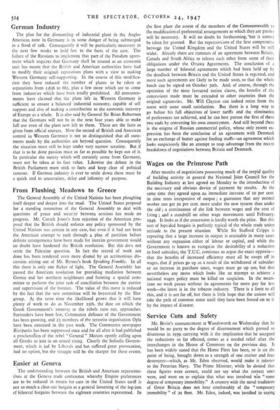Wages on the Primrose Path
After months of negotiations possessing much of the torpid quality of building activity in general the National Joint Council for the Building Industry at last agreed on Monday to the introduction of the necessary and obvious device of payment by results. At the same time they agreed upon an immediate increase of to per cent. in time rates irrespective of output ; a guarantee that any normal worker can get 20 per cent. more under the new 'system than under the old ; a continuance of the link between'wages and the cost of living ; and a standstill on other wage movements until February, 1949. It looks as if the concession is hardly worth the price. But this sort of lopsided bargain is perfectly typical of the whole trade union attitude to the present situation While Sir Stafford Cripps is repeating that a large increase in output is attainable in many cases without any expansion either of labour or capital, and while the Government is known to recognise the desirability of a reduction in food subsidies, the T.U.C. continues to argue the exact opposite— that the benefits of increased efficiency must all be swept off in wages, that if prices go up as a result of the withdrawal of subsidies or an increase in purchase taxes, wages must go up too, but that nevertheless any move which looks like an attempt to achieve a national wages policy must be killed on suspicion. In the mean- time no week passes without its agreements for more pay for less work—the latest is in the tobacco industry. There is a limit to all this, and it is not far off, but there is little hope that the unions will take the path of common sense until they have been forced on to it by the impact of disaster.
































 Previous page
Previous page